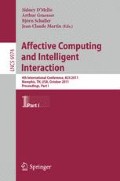Abstract
This work describes a computational model designed for emotional contagion simulation in societies of agents, integrating the influence of interpersonal relationships and personality. It models the fundamental differences in individual susceptibilities to contagion based on the psychology study of Emotional Contagion Scale. The contagion process can also be biased by inter-individual relationships depending on the intimacy and power difference aspects of relationships between agents. Individuals’ expressiveness in a group is influenced by both the extroversion personality trait and power difference.
Additionally, the computational model includes the process of mood decay, as usually observed in people, expanding its application domain beyond that of pure simulation, like games. In this paper we present simulation results that verify the basic emotional contagion behaviors. The possibility of more complex contagion dynamics depending on agent group relationships is also presented.
Access this chapter
Tax calculation will be finalised at checkout
Purchases are for personal use only
Preview
Unable to display preview. Download preview PDF.
References
Barsade, S.: The Ripple Effect: Emotional Contagion and Its Influence on Group Behavior. Administrative Science Quarterly 47(4), 644–677 (2002)
Bispo, J., Paiva, A.: A model for Emotional Contagion Based on the Emotional Contagion Scale. In: 3rd International Conference on Affective Computing and Intelligent Interaction and Workshops, ACII 2009, pp. 1–6. IEEE, Los Alamitos (2009)
Bosse, T., Duell, R., Memon, Z., Treur, J., van der Wal, C.: A Multi-agent Model for Emotion Contagion Spirals Integrated within a Supporting Ambient Agent Model. In: Yang, J.-J., Yokoo, M., Ito, T., Jin, Z., Scerri, P. (eds.) PRIMA 2009. LNCS, vol. 5925, pp. 48–67. Springer, Heidelberg (2009)
Castellano, G., Leite, I., Pereira, A., Martinho, C., Paiva, A., McOwan, P.: It’s all in the game: Towards an affect sensitive and context aware game companion. In: International Conference on Affective Computing and Intelligent Interaction (2009)
Doherty, R.: The emotional contagion scale: A measure of individual differences. Journal of Nonverbal Behavior 21(2), 131–154 (1997)
Fredrickson, B.: The role of positive emotions in positive psychology: The broaden-and-build theory of positive emotions. American Psychologist 56(3), 218–226 (2001)
Fredrickson, B., Joiner, T.: Positive emotions trigger upward spirals toward emotional well-being. Psychological Science 13(2), 172 (2002)
Hatfield, E., Cacioppo, J., Rapson, R.: Emotional contagion. Current Directions in Psychological Science 2, 96–99 (1993)
Hatfield, E., Cacioppo, J., Rapson, R.: Emotional contagion. Cambridge Univ. Pr., Cambridge (1994)
Hogg, M., Tindale, R.: Blackwell handbook of social psychology: Group processes, pp. 165–181. Wiley-Blackwell (2002)
Hsee, C., Hatfield, E., Carlson, J., Chemtob, C.: The effect of power on susceptibility to emotional contagion. Cognition & Emotion 4(4), 327–340 (1990)
Junseok, H., Chansun, J., Junhyung, P., Jihye, R., Ilju, K.: An artificial emotion model for visualizing emotion of characters. Proceedings of World Academy of Science: Engineering & Technology 50, 567–573 (2009)
Kimura, M., Daibo, I., Yogo, M.: The study of emotional contagion from the perspective of interpersonal relationships. Social Behavior and Personality: an International Journal 36(1), 27–42 (2008)
Marreiros, G., Ramos, C., Neves, J.: Dealing with emotional factors in agent based ubiquitous group decision. In: Enokido, T., Yan, L., Xiao, B., Kim, D.Y., Dai, Y.-S., Yang, L.T. (eds.) EUC-WS 2005. LNCS, vol. 3823, pp. 41–50. Springer, Heidelberg (2005)
Oatley, K., Keltner, D., Jenkins, J.: Understanding emotions. Wiley-Blackwell (2006)
Perera, N., Kennedy, G., Pearce, J.: Are you bored?: Maybe an interface agent can help? In: Proceedings of the 20th Australasian Conference on Computer-Human Interaction: Designing for Habitus and Habitat, pp. 49–56. ACM, New York (2008)
Picard, R.: Affective computing. The MIT Press, Cambridge (2000)
Poggi, I.: Enthusiasm and Its Contagion: Nature and Function. In: Paiva, A.C.R., Prada, R., Picard, R.W. (eds.) ACII 2007. LNCS, vol. 4738, pp. 410–421. Springer, Heidelberg (2007)
Snodgrass, S.: Women’s intuition: The effect of subordinate role on interpersonal sensitivity. Journal of Personality and Social Psychology 49(1), 146–155 (1985)
Sykes, J., Brown, S.: Affective gaming: measuring emotion through the gamepad. In: CHI 2003 Extended Abstracts on Human Factors in Computing Systems, pp. 732–733. ACM, New York (2003)
Author information
Authors and Affiliations
Editor information
Editors and Affiliations
Rights and permissions
Copyright information
© 2011 Springer-Verlag Berlin Heidelberg
About this paper
Cite this paper
Pereira, G., Dimas, J., Prada, R., Santos, P.A., Paiva, A. (2011). A Generic Emotional Contagion Computational Model. In: D’Mello, S., Graesser, A., Schuller, B., Martin, JC. (eds) Affective Computing and Intelligent Interaction. ACII 2011. Lecture Notes in Computer Science, vol 6974. Springer, Berlin, Heidelberg. https://doi.org/10.1007/978-3-642-24600-5_29
Download citation
DOI: https://doi.org/10.1007/978-3-642-24600-5_29
Publisher Name: Springer, Berlin, Heidelberg
Print ISBN: 978-3-642-24599-2
Online ISBN: 978-3-642-24600-5
eBook Packages: Computer ScienceComputer Science (R0)

